In the Maldives, coral reefs are essential for the economy and environment, attracting tourists and supporting local fisheries. However, rising sea temperatures, pollution, and luxury resort development threaten these delicate ecosystems. Many resorts are adopting sustainable practices to mitigate their impact. Initiatives like the ReefSeed Project and community involvement are crucial for coral conservation. If you’re curious about how resorts and local efforts evolve to protect these vital reefs, there’s plenty more to explore.
Key Takeaways
- Coral reefs in the Maldives are crucial for tourism, fisheries, and coastal protection, making their conservation vital for the local economy.
- Luxury resorts can harm coral ecosystems through construction, pollution, and increased tourist activities, threatening both coral health and local livelihoods.
- Sustainable practices, such as solar power and waste recycling, are being implemented by resorts to minimize their environmental impact on coral reefs.
- Conservation initiatives, like the ReefSeed Project and collaborations with Four Seasons Resorts, focus on coral restoration and community involvement for long-term success.
- Technological advancements, including AI, are enhancing coral restoration efforts, ensuring better monitoring and recovery of damaged reefs.
The Importance of Coral Reefs in the Maldives
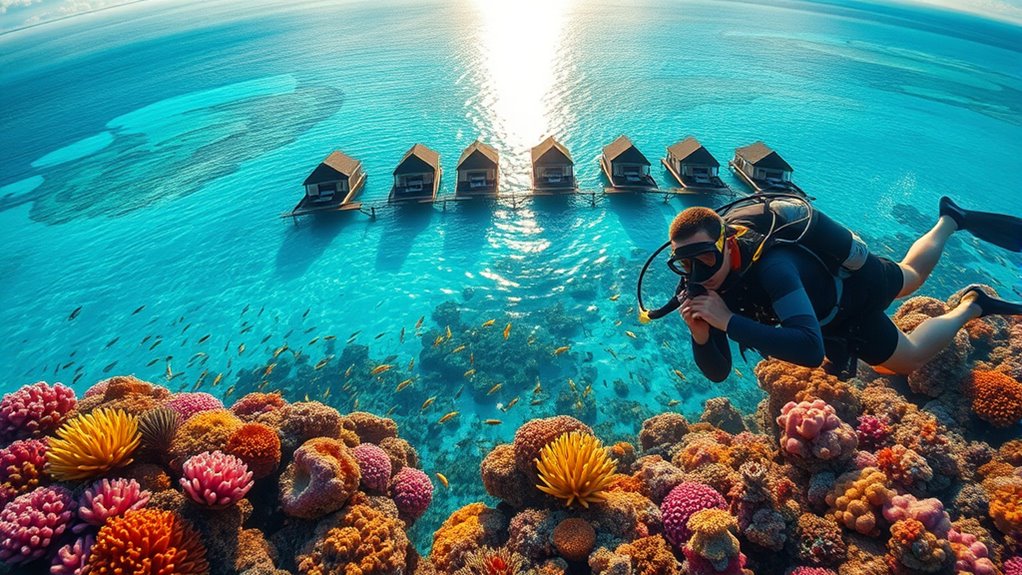
Coral reefs in the Maldives are vital to both the economy and the environment, playing a crucial role in sustaining local communities. They attract tourists from around the globe, with diving and snorkeling being popular activities that boost the economy. These reefs support reef-associated fisheries, which account for 98% of the Maldives’ exports, ensuring livelihoods for many. The tourism industry, heavily reliant on these ecosystems, employs about 58% of the workforce, contributing significantly to national revenue. Additionally, coral reefs provide coastal protection against storms and erosion, safeguarding island communities. They also enhance water quality and support biodiversity, making them essential for both environmental health and sustainable development in the Maldives. Furthermore, 23 coral species have been classified as critically endangered, highlighting the urgent need for conservation efforts to protect these vital ecosystems.
Threats Facing Coral Ecosystems

As climate change progresses, coral ecosystems in the Maldives face numerous threats that jeopardize their health and resilience.
Rising sea temperatures lead to thermal stress, causing mass bleaching events that have impacted as much as 100% of corals during severe occurrences. Ocean acidification further weakens corals, making it harder for them to build calcium carbonate structures.
Rising sea temperatures and ocean acidification severely threaten coral health, leading to widespread bleaching and weakened structures.
Overfishing disrupts the ecological balance, while pollution from land and tourism exacerbates reef degradation. Additionally, coastal development harms habitats and reduces light for photosynthesis.
Increased disease and predation, particularly from crown-of-thorns starfish, contribute to declining coral health and biodiversity. Together, these challenges threaten the very existence of these vital ecosystems, highlighting the urgency for effective conservation efforts.
The Impact of Luxury Resorts on Coral Health
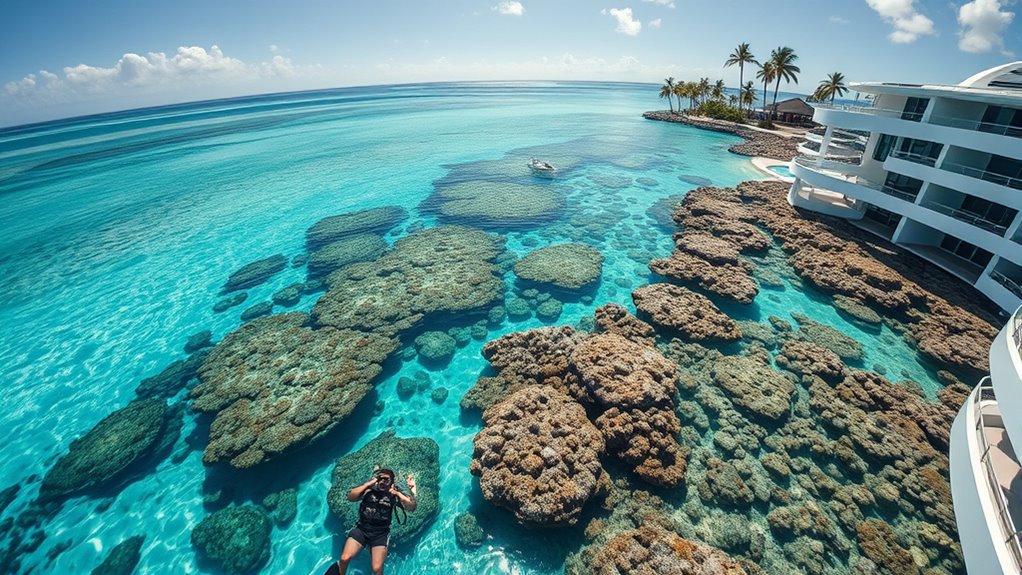
The challenges facing coral ecosystems in the Maldives extend beyond natural threats to include the growing influence of luxury resorts.
These resorts often cause direct damage through construction and dredging, disrupting natural habitats and harming marine biodiversity. Poor sewage management contributes to pollution, which further deteriorates coral health.
The influx of tourists increases resource demand, straining local ecosystems. Additionally, unregulated tourist activities like snorkeling can inadvertently harm the reefs.
While tourism generates vital income and job opportunities, the degradation of coral reefs threatens the very livelihoods of local communities.
It’s crucial to recognize that healthy coral ecosystems aren’t only essential for tourism but also for food security and cultural heritage in the Maldives.
Sustainable Practices in Resort Management
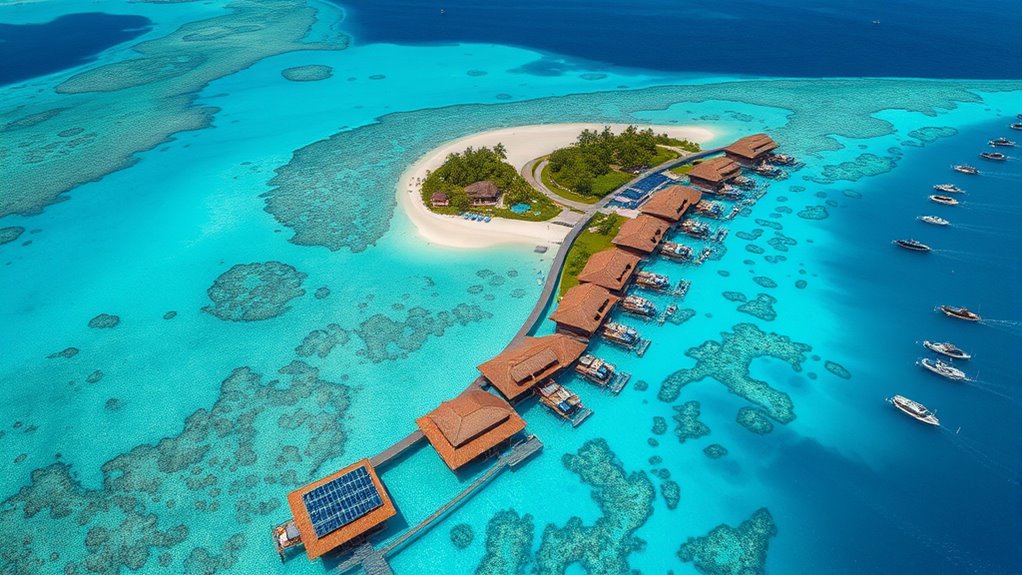
While enjoying the luxurious amenities of Maldives resorts, you’re likely to notice their commitment to sustainability. Many resorts, like Kudadoo Maldives Private Island, are fully solar-powered, reducing fossil fuel reliance.
Six Senses Laamu aims to cut diesel use significantly by 2030, while Soneva Fushi covers 40% of its energy needs with solar power.
In terms of waste management, Soneva Fushi recycles 90% of its waste and implements zero waste policies.
Resorts are also focused on sustainable water management, using desalination plants and rainwater collection.
Furthermore, dining experiences often feature on-site food production and locally sourced ingredients, minimizing waste and supporting local farmers.
These practices not only enhance your stay but also protect the stunning environment around you.
Conservation Efforts and Initiatives
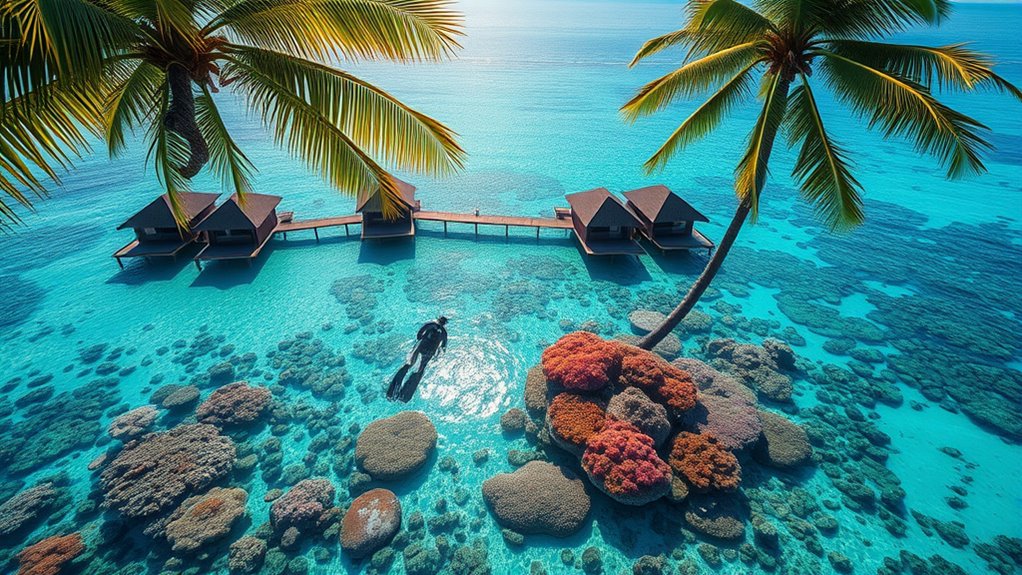
Recognizing the urgency of protecting coral reefs, various conservation efforts and initiatives in the Maldives are gaining momentum.
You’ll find projects like the ReefSeed Project, which uses portable aquaculture systems to restore reefs in remote areas. The MARRS System employs star-shaped scaffolds for rapid rebuilding, supported by local communities.
Through a partnership with Reefscapers, Four Seasons Resorts work on coral restoration using innovative techniques like coral frames. Additionally, community involvement ensures the success of these initiatives by providing training and monitoring.
Technological advancements, including AI, play a crucial role in analyzing data and enhancing restoration efforts. These initiatives aim to combat challenges like coral bleaching and pollution, ensuring the future health of the Maldives’ valuable coral ecosystems.
The Role of Stakeholder Engagement in Conservation
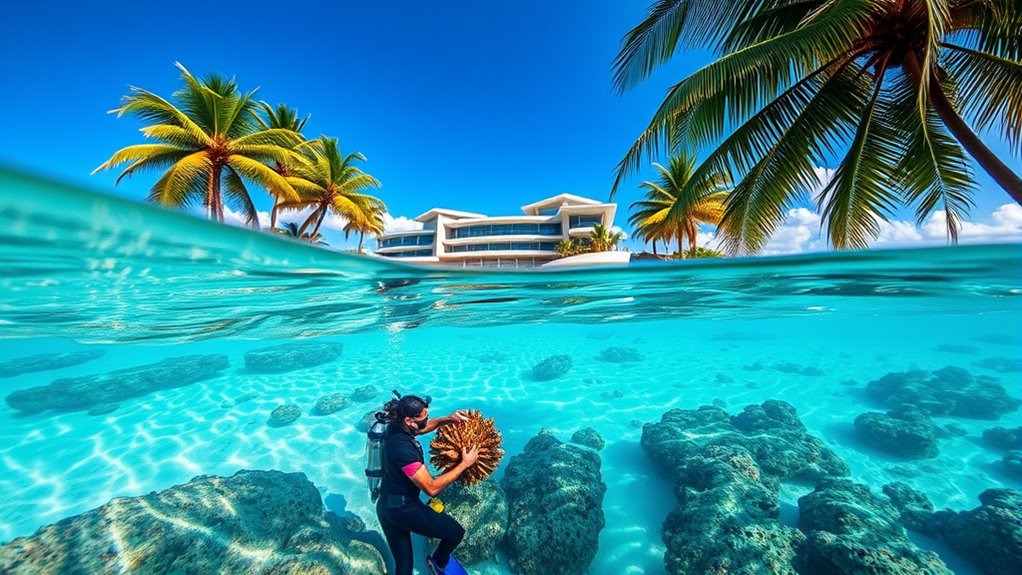
Efforts to restore coral reefs in the Maldives have highlighted the importance of engaging various stakeholders in conservation. The tourism industry collaborates with NGOs, local communities, and researchers to create effective strategies.
Local communities play a crucial role, needing education about the reefs’ significance to boost their participation. Multi-stakeholder alliances, involving government agencies and private businesses, enhance reef protection and fisheries management.
Engaging these groups fosters mutual benefits, supporting local livelihoods while conserving biodiversity. While challenges like conflicting interests and climate change exist, successful strategies like community-led initiatives and partnerships with educational institutions can drive effective management. Additionally, understanding safe foraging practices can help local communities sustainably utilize marine resources while contributing to reef health.
Raising Awareness and Education for Coral Protection
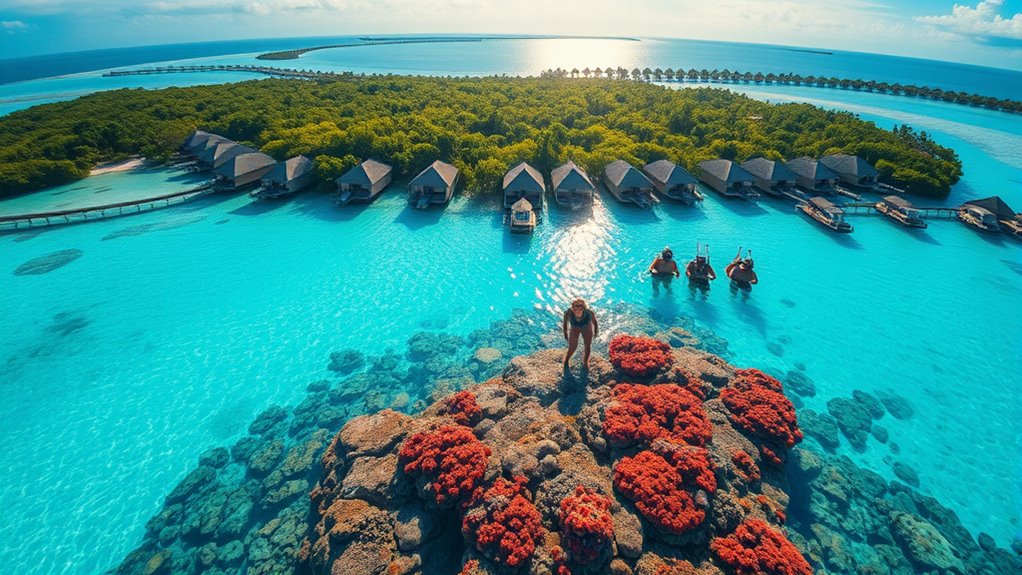
As coral reefs face increasing threats from climate change and human activities, raising awareness and education are vital for their protection.
The Maldives Coral Institute leads education campaigns highlighting the importance of coral ecosystems. Events like the Coral Festival engage the public, fostering appreciation for coral reefs.
You’ll find educational programs covering coral biology, ecology, and the threats they face. Participate in hands-on training, such as the Maldivian Coral Reef Restoration Workshop, where you can earn an Open Badge certification.
Engaging youth through projects like Muraka Kudhin inspires future conservationists. Community initiatives, like those from Save The Beach Maldives, empower locals to protect coral reefs.
Together, these efforts cultivate a knowledgeable and passionate community committed to coral conservation.
Frequently Asked Questions
What Types of Coral Species Are Found in the Maldives?
In the Maldives, you’ll find a variety of coral species that contribute to the region’s rich biodiversity.
Common types include Staghorn Coral, which helps build reef structure, and Brain Coral, providing habitat for many fish.
You’ll also encounter Plate Coral and Finger Coral, alongside Honeycomb Coral.
Each species plays a vital role in supporting marine life and maintaining the overall health of the ecosystem.
Exploring these reefs is a truly unique experience!
How Do Local Fishing Practices Affect Coral Health?
Imagine diving into vibrant coral reefs, only to find them fading away. Your local fishing practices play a crucial role in this alarming reality.
When overfishing occurs, it disrupts the delicate balance of reef ecosystems. Destructive methods further damage these habitats, leading to biodiversity loss.
As you fish, consider the long-term effects on coral health and the community’s future. Sustainable practices not only protect the reefs but also ensure your livelihood thrives for generations to come.
What Role Do Invasive Species Play in Coral Degradation?
Invasive species play a significant role in coral degradation by directly harming coral populations.
When you see organisms like the Crown-of-Thorns starfish, know they’re consuming coral and causing extensive damage.
These species also introduce diseases and promote harmful algae growth, which can smother corals.
How Can Tourists Contribute to Coral Conservation Efforts?
Imagine a garden where each flower represents a coral; if you nurture it, the whole garden thrives.
As a tourist, you can contribute to coral conservation by choosing eco-friendly accommodations that support restoration projects.
Participate in local conservation activities, educate yourself about reef ecosystems, and consider making voluntary contributions to fund these efforts.
Your awareness and actions can help ensure that the vibrant underwater garden flourishes for generations to come.
What Are the Long-Term Economic Impacts of Coral Decline?
Coral decline has serious long-term economic impacts.
You’ll notice reduced tourist numbers, leading to job losses in hospitality and recreation sectors. With fewer visitors, local businesses suffer, and revenue drops significantly.
Fisheries also face depletion, threatening food security and livelihoods for communities relying on fishing.
Additionally, without healthy reefs, coastal areas become more vulnerable to storms, increasing infrastructure costs and property damage.
Ultimately, these effects can destabilize local economies for years to come.
Conclusion
So, if you ever thought lounging at a luxury resort while sipping a cocktail could save the coral reefs, you’re not alone! Just remember, while you’re soaking up the sun, those vibrant reefs are gasping for breath beneath the waves. But hey, as long as the swim-up bar stays stocked, who cares, right? Let’s raise awareness while we’re at it—because nothing says “I love nature” like a selfie with a coral reef in the background!









